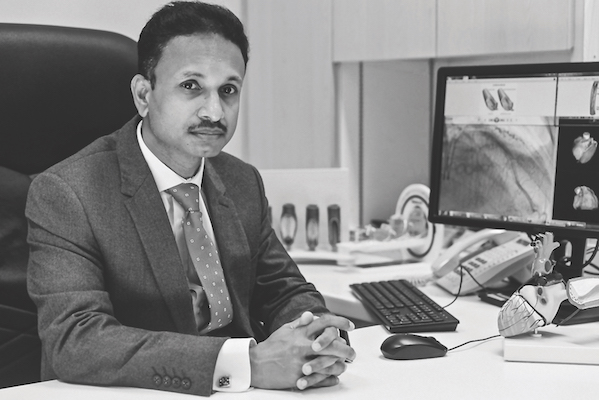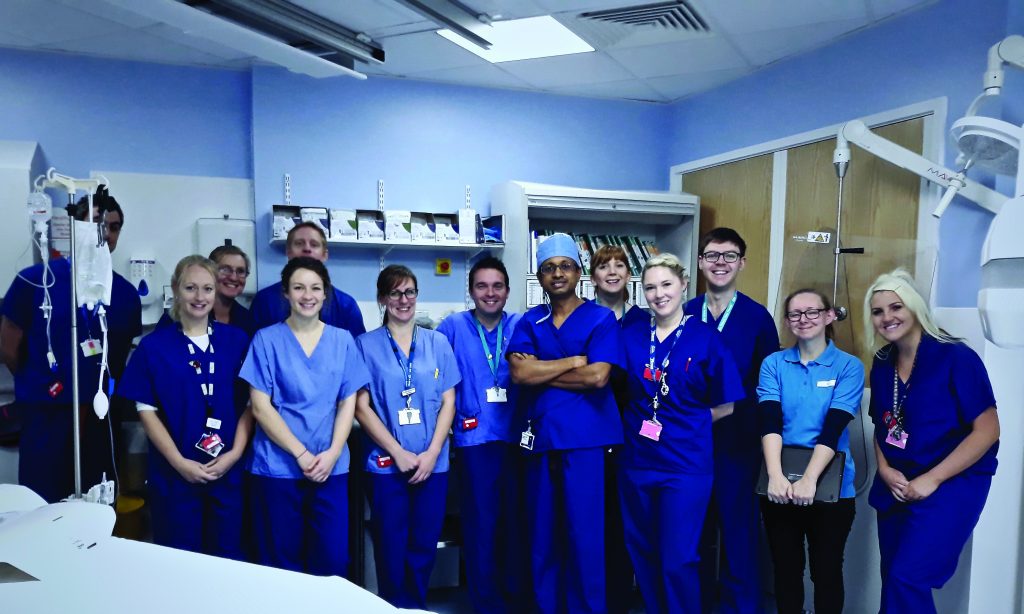Cardiologist Dr. Ramasami Nandakumar shares advice on how to maintain a healthy heart.
By Ashima Sethi
Dr. Ramasami Nandakumar, also known as Dr. Kumar, is one of Singapore’s leading cardiologists. As a Senior Interventional Cardiologist at Cardiac Centre International, The Mt. Elizabeth Hospitals (Orchard & Novena) and Mount Alvernia Hospital, Dr. Kumar has gathered a wealth of knowledge through his profound experiences in both medical school and practice. Masala meets this celebrated specialist to discuss why South Asians are at a high risk for heart diseases, as well as the steps that can be taken to protect their health.
Did you always have an interest in medicine and health?
At school, I had an interest in the ecosystem which only grew as time went on. This interest, coupled with a fascination for sociology, led me down the path of medicine when I began university.
What led you down the career path of becoming a cardiologist?
I remember a time when my friend’s father passed away suddenly. He was only in his 40s, so this was the first time I was exposed to how devastating a heart attack could truly be. Following his death, I learnt that the attack could’ve been easily prevented and treated, and it was this realisation that prompted me to pursue a career in cardiology.
So what training did you undergo to become a cardiologist?
After I completed my undergraduate studies in 1995 in Coimbatore, India, I left for the United Kingdom where I trained at a number of hospitals across the country. Upon completing specialist training in interventional cardiology in London, I took up a consultant post in the National Health Service (NHS) based in Lincolnshire. I then returned to Asia in 2011 to work in Chennai, India, after which I moved to Singapore in 2013.
What are some notable accomplishments you’ve achieved in your field?
When I moved to Singapore, I helped set up a new cardiac catheter laboratory with my colleagues. As the Associate Program Director, I am involved in the training of junior colleagues, helping to facilitate lectures and ensuring trainees are confident in presentations at international conferences. Moreover, I also continually examine for the MRCP tests in the UK as very few cardiologists from Singapore are doing so.
What kind of patients do you see on a regular basis?
The majority of my patients have lifestyle diseases, such as obesity, high blood pressure, diabetes and high cholesterol. Many complain of chest pain and discomfort, and require tests for coronary diseases, such as blockages in blood vessels.
Patients with fainting, dizziness and palpitations are also seen.
It is said that South Asians are at a much higher risk for heart disease compared to Asians from other regions. Why is this the case?
It is indeed true. The risk of a heart attack for South Asians is twice as high as ethnic Chinese, and this risk remains the same regardless of where you live or move. The reasons are multifactorial but appear to be due to both nature, because of high-risk fats in the blood, as well as nurture, which includes lifestyle and behavioural aspects.
What lifestyle changes should a person make to maintain a healthy heart?
• Take part in more aerobic exercises
• Eat good quality food; avoid processed foods, minimise oil, salt and saturated fat intake, and opt for more fruits and vegetables
• Stop smoking
• Avoid stressing out
• Get good sleep
What tips can you offer individuals who have hectic schedules?
Many of my patients are office goers who are working stressful jobs and long hours. This often involves eating high energy food at irregular intervals, drinking sugary drinks to ‘keep going’ and not having the time to relax, exercise or sleep well. And so, it is extremely important to allocate time for yourself. ‘You’ time must be of utmost priority in your daily schedule, and ensure that the people you surround yourself with respect this rule.
Even a little movement can go a long way, so just walking around the workspace or to nearby places can make a difference. Make sure to feed yourself well and choose freshly prepared foods with low salt and sugar levels whenever possible.
With the possibility of silent attacks, what can be done to minimise the risk?
Sometimes the only symptoms of an attack are severe fatigue, sweating, fainting or confusion. Pain in the stomach is sometimes confused as acid reflux. To detect an attack, an individual must practice being suspicious of symptoms, especially if there is a strong family history and presence of risk factors, such as high blood pressure, raised cholesterol or diabetes.
How can someone identify the symptoms of a heart attack?
Symptoms can include crushing pain in the centre of the chest, which radiates to other locations. The pain is excruciating and can be described as a squeezing sensation, similar to a vice around the chest. Profuse sweating and breathlessness are also common. On occasion, heart attacks present themselves as sudden cardiac arrest where the heart suddenly stops suddenly and the patient loses consciousness.
What steps can be taken to assist someone who is having an attack?
• First priority is to suspect that the individual is having an attack and seek out emergency help right away.
• If the patient is conscious, administer aspirin and a nitrate tablet under the tongue.
• If the patient is unconscious, start basic life support. This involves attaching an Automatic External Defibrillator (AED) if you are in a public space. I urge everyone to undergo basic life support training as these skills could come in handy one day.
What do you hope to achieve in the future?
I want to help the South Asian community understand that the overall risk of heart disease can be decreased by taking action on modifiable factors, such as adopting lifestyle and behavioural changes and scheduling screenings when necessary. What I’ve noticed is that many people avoid screenings because of the fear of what it might show. My hope is that everyone can make more effort to seek medical help when needed, as well as practice good health for themselves and their families.
For more information, visit www.facebook.com/Heart2HeartClinic
For specific queries, email Dr. Kumar at drkumar@h2h.com.sg







